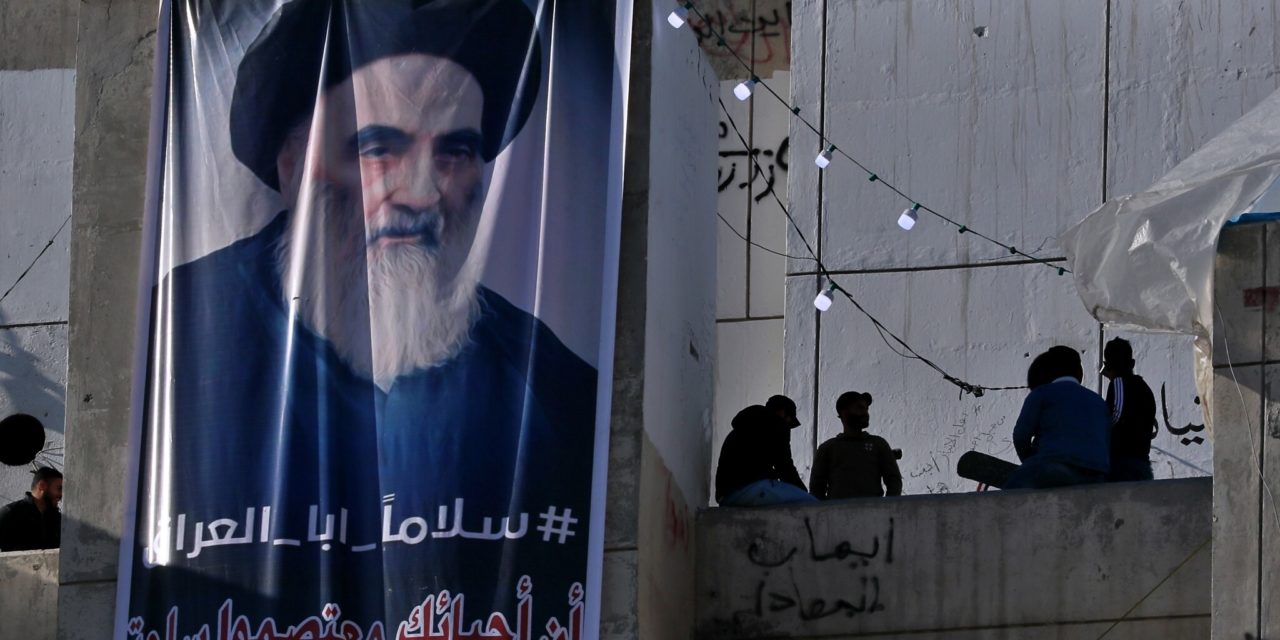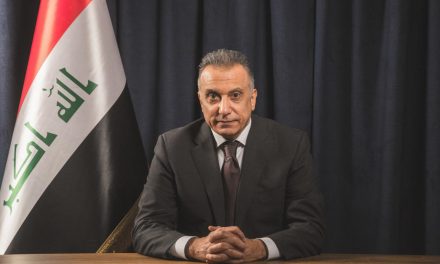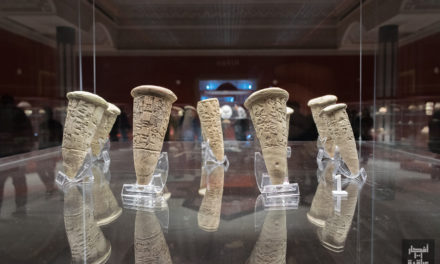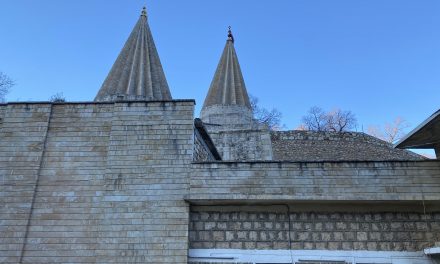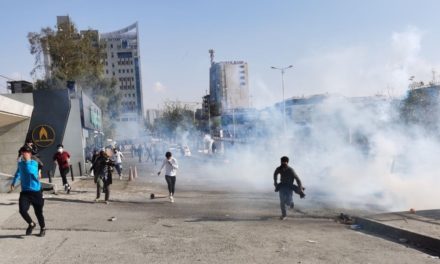(Photo: Khalid Mohammed/AP)
I recently delved into David Patel’s book, Order out of Chaos: Islam, Information, and the Rise and Fall of Social Orders in Iraq. The book, although published in 2022, draws on Patel’s fieldwork in southern Iraq shortly after the fall of the Ba’ath regime in 2003. In his book, Patel focuses on why Iraqis turned to the mosque in the absence of the state and while examining this, Patel naturally turns to the question of who is running the mosques in Iraq. For the Shia Muslims who constitute the majority of Iraqis, the answer is Grand Ayatollah Ali Al-Sistani, the head of the religious establishment, the Marjʿiyya, in Najaf.
Grand Ayatollah Sistani, who turned 93 in August, has been a monumental figure in Iraq for the last twenty years. All the critical moments in post-2003 Iraq have involved Sistani in one form or another, many of which Patel analyzes in his book. However, Patel is less interested in who Sistani is and more interested in the limits of the Grand Ayatollah’s power. Patel writes that “conventional wisdom—which focuses on Shiʿi doctrine and Sistani’s worldview—is not wrong, it is just incomplete”.
Analyzing the scope of Grand Ayatollah Sistani’s power is vital, and for that alone it is worth reading Patel’s book. He examines the power dynamics of the religious establishment broadly as well as local clerics affiliated with it and those unaffiliated with it. As I read this, I was preoccupied with one question: What does Grand Ayatollah Sistani owe Iraq?
It is not the job of Patel’s book to answer this question, but rather it is a question that Iraqis who have both criticized or praised Grand Ayatollah Sistani should consider. Many have analyzed Sistani’s decisions as the head of the Marjʿiyya, the impact of his decisions on the political landscape of the country, and now the limitations of his power, but missing from all of this is the fundamental question of what can Iraqis ask of Grand Ayatollah Sistani?
Before attempting to answer this question, it must be acknowledged that historically a lot is expected from whoever is leading the Marjʿiyya during a sensitive political period, especially if there is a vacuum in leadership. For instance, during the 1991 Shabaniya uprising in southern Iraq, many Shia rebels anticipated a decisive endorsement from Grand Ayatollah Abulqasim Al-Khoei, Sistani’s predecessor. They looked to Grand Ayatollah Khoei as a potential guiding force that they can rally behind as they lacked political leadership. However, Grand Ayatollah Khoei’s directives were aimed at maintaining social order as opposed to leading the uprising (a case of a security vacuum that Patel could have examined for his book). The uprising would later be crushed by the Ba’ath regime and Khoei’s decision left many disappointed and embittered, ultimately contributing to strained relations between Iraqi Shia and the Marjʿiyya.
Some argue that such a role is not within the scope of clerics in Najaf. They assert that religious leaders should not be expected to assume such leadership roles. However, after the fall of Saddam Hussein’s regime, the Marjʿiyya once again found itself facing similar expectations. This time, and under the leadership of Grand Ayatollah Sistani, the Marjʿiyya gave direction and had their say in political developments. When the Marjʿiyya’s involvement was seen as positive, they were praised by their followers, and when it was seen as negative, loyal supporters rushed to defend the clerics by asserting that they were only offering advice and that they hold no power. This goes back to the question I asked earlier: what should Shia Iraqis expect from Grand Ayatollah Sistani? Is he obligated to get involved? Should he be criticized for the outcomes of his advice given that he does not hold a formal office in the Iraqi state?
Sistani leads a transnational religious institution with millions of followers outside of Iraq. Western observers new to Iraq do not tire of reminding us of his Iranian nationality (despite Sistani having lived in Iraq for over the last seven decades). Sistani’s followers span the globe, yet he seldom comments on politics outside of Iraq, with the exception of Palestine. Is it logical to expect his involvement in Iraqi affairs merely because the religious seminary, the Hawza, is situated in Najaf? Furthermore, should non-Iraqi Shia followers of Grand Ayatollah Sistani, who contribute tithes to his office, form their own set of expectations and demand as involvement as well?
As result of Iraqis’ displeasure with their political leaders, there has been a persistent leadership vacuum in the country. Despite two decades of democratization, trust between citizens and politicians eroded under the pressures of violence and corruption. This has driven many towards the religious establishment, seen as a legitimate institution with a clear leadership. This is why, during the 2019 Tishreen protests, secular protestors still looked towards the religious establishment for support, guidance, and even legitimacy.
The now cemented position of leadership of the religious establishment in Najaf for Shia is why Kurdish politicians from the Kurdistan Democratic Party in Arabic now refer to their party’s leader Masoud Barzani as their “Kurdish Marjaʿ”, in an attempt to impose his leadership on all Iraqi Kurds, despite him not holding formal office since late 2017. Although the word “Marjaʿ” has religious connotations associated with Shi’ism, its literal translation to “resource” or “guide” allows it to be a versatile tool for other ethnic or religious groups.
Grand Ayatollah Ali Al-Sistani is a towering figure in Iraq. For years to come, scholars will examine his role in a momentous period in Iraq’s history, but they will likely take his involvement for granted. It is left to Iraqis – of all backgrounds – to think critically about what expectations we hold of different leaders, elected and unelected. After all, our expectations may be what drives, at least partially, how Grand Ayatollah Sistani’s successors will come to view their role.


